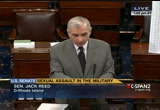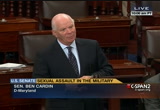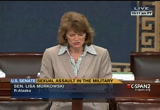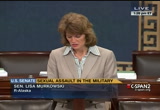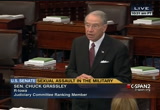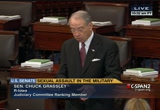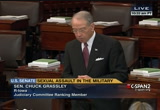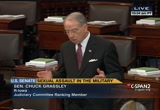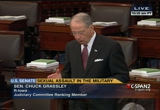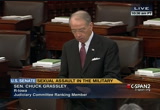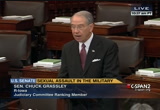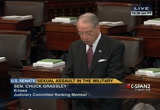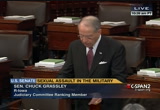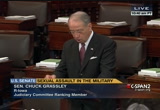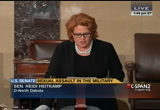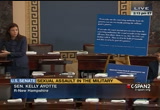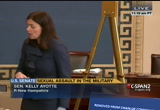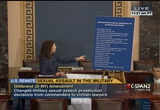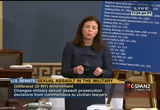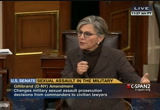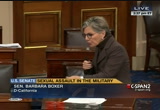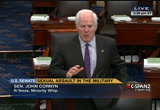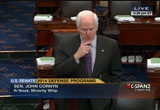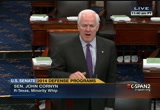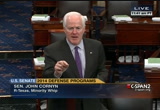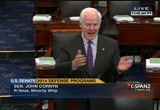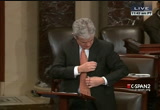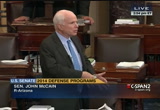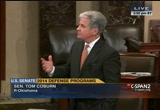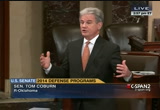tv Key Capitol Hill Hearings CSPAN November 20, 2013 1:00pm-3:01pm EST
1:00 pm
summary court-martial or an article 15. once he is informed by counsel that he will not be subject to a general court-martial or a special court-martial and he can turn down a summary court-martial or article 15rbg the soldier will invariably refuse the summary court-martial or article 15. ironically, in doing he, he will demand a court-martial but the commander cannot comply, as he can now, because he's already been preempted by the special prosecutor, the independent prosecutor. now, this scenario will play out over and over again. a unit is plagued by a series of steps which unchecked erodes good order and discipline. the commander has information one soldier is boasting about ripping off other people but has no other evidence. an iphone is found in the boasting soldier's room. under the gillibrand amendment the commander nuss must refer to
1:01 pm
the case to the independent prosecutor and will have the issues of whether the independent prosecutor takes the case and not the likelihood the accused will refuse a summary court-martial article 15 and walk free. incidents like this -- this is not the intent of the legislation -- will erode unit cohesion and raise questions at least implicitly who is really running the unit, the commander, an unseen and unknown j.a.g. hundreds of miles away, or individual soldiers whom they appear to be violating the rules with impunity. this question is important here, but it is critical when a commander has to order soldiers to do dangerous things, and that ultimately is what commanders have to do, and soldiers have to have no doubt that the commander, he or she, is fully in charge. now, as i referenced earlier the birthday education of the articles of ucmj poses
1:02 pm
significant challenges even of itself. the problems with the drafting of this amendment complicates not just cases of common theft, not just issues that u.c. -- we could figure a way out but the sexual of sexual assault we're trying to address. let's take this, another example, of a married couple both of whom are active duty service members who get into a shouting match in their quarters on post. the husband stabs the wife with a kitchen knife and knocks her unconscious. she provides a statement but later retracts it. they have another argument. under the eligible amendment the first -- the gillibrand amendment, the first offense would have to be referred to the independent prosecutor to decide whether to send the case to court-martial. while the offense of assault with intent to commit rape specified under article 134, general article is right here, is exempt from the gillibrand
1:03 pm
proposal and would be referred to the chain of command. assuming both the independent prosecutor and the commander seek a general court-martial, this particular victim will now have to testify two separate article 32 hearings, two subsequent courts-martial, at least doubling the numbers of times she must recount her nightmare. the accused will demand and likely get two separate panels for each set of offenses doubling the number of officers unavailable for other duties in the command and moarnl doubling the administrative personnel and witnesses associated with the general court-martial. now, this is a situation where rather than stream liedges liepg --, streamlining, reinforcing the military's efforts to deal with sexual abuse we've confused them, delayed them, we've put commanders in the position of competing with independent prosecutors. this is not i think going to add to the solution on a practical
1:04 pm
basis of how we deal with sexual abuse. we know that so many of the men and women in our armed forces serve our nation selflessly. they're prepared to give their lives for a comrade. sexual assault is the antithesis, and if not eliminated will insidiously destroy our military. i believe preventing sexual abuse requires leadership at every stage and commanders must be involved in every step. i believe that we will make the most progress addressing this issue by involving and holding commanders accountable, not by secluding them from a critical aspect of military life. we've have worked tensive to improve the prevention of sexual assault, and the prosecution of perpetrators and pledge to do more to continue our oversight, make further changes if needed. we owe it to those who bravely and honorably wear the uniform of our nation. and with that, madam president, i would yield the floor.
1:05 pm
a senator: madam president? the presiding officer: the senator from maryland. mr. cardin: mr. president, first let me thank senator gillibrand for her leadership on this issue of sexual assaults in our military. i support her amendment. i believe we need to look at a new way to deal with this issue so there's not only confidence within the military but within our country that sexual assault will not be tolerated in our military and that we have an effective way to deal with it. i want to thank senator gillibrand. it is quite clear as senator reed said, without her leadership we would not be having these discussions on the floor of the united states senate today and i applaud her for that. madam president, if i could ask
1:06 pm
that the remainder of my comments be separated in the record. the presiding officer: without objection. mr. cardin: madam president, we are now dealing with the ndaa bill, the national defense authorization act. it's our opportunity as a senate to weigh in on one of the primary roles of government, the security of our country, how we can support our men and women in our military service, make sure they have the best equipment and the best support, and live up to our commitments to our veterans when they return to civilian life. it's very -- it's an awesome responsibility and i know each of us in our own capacities need to rely on outside help in order to be able to carry out this responsibility. we have staff. in my case, i've been blessed to have a detailee from the department of defense from the air force. that person is major nate summers and i mention that because he'll be leaving my assignment very shortly within the next week or so, and i
1:07 pm
wanted to take this time to let my colleagues know but also to let all the members -- all the people know that these detailees assigned to our office play a critical role. he's helped me in developing provisions that are in the national defense authorization act and amendments that we are offering that deal with military health issues, that deal with regional security concerns, that deal with the impact of sequestration and how we can deal with the impact of sequestration, and to deal with human rights issues with u.s. leadership globally as well as within the military. to say the least, i could not have done this as effectively as i needed to on behalf of the people of maryland if it was not for major nate summers. he comes to this assignment with an incredible background. his military record is unbelievable. major nate summers has dedicated his life to serving our nation. he started his career with the
1:08 pm
u.s. air force in 2001 when he graduated and received his commission through the officers training program at mississippi state university. he also i might add has two masters' degrees. nate went on to serve in arkansas, florida and virginia and was deployed in support of both operation iraqi freedom and operation enduring freedom. prior to joining my office, major summers served as lee azune between -- zee liaison between air combat command on issues ranging from constituent inquiries to weapons systems. over the course of his incredible career, major summers has earned 17 different major awards and decorations including the meter yus service medal and the air force commendation medal. he received these awards comes as no surprise to those who know him. nate demonstrates his extraordinary service to our nation and to our armed forces
1:09 pm
each and every day. there's hardly a day that goes by i am not better informed because of his assignment to my senate office. to say that major summers will be missed in my office is an understatement. nate has truly been an integral part of my staff whether ensuring that our maryland veterans get the services they need or advising me on the complex defense issues that were no task would or could not do to help our office. the air force should be proud of this extraordinary talent that they is have in major nate summers. i thank him for his service to his nation and thank his -- take this opportunity for his wife and son for sharing nate with the u.s. senate and service to our country. with that, madam president, i would yield the floor.
1:10 pm
a senator: madam president? the presiding officer: the senator from alaska. ms. murkowski: madam president, yesterday morning i was pleased to be able to come to the floor of the united states senate, join with a good strong handful of women on both sides of the aisle to express our joint commitment, really i think the commitment of every member of this body to address the scourge of sexual assault, sexual misconduct within the military. i think it was a good way to start off the debate yesterday on the issue of sexual assault within the military, recognizing that we are coming to different places in terms of how we deal with these very important issues. but ultimately the goal of each
1:11 pm
of us is the same. the goal is that we make right for those who are serving our nation and when it comes to instances of sexual assault, military sexual trauma, sexual harassment, that really there is no place in our military for this. so it was a good way, again, to start the debate on these very important topics. we use different terminology when we're discussing the issue of military sexual assault, how we define what we're seeking to eradicate i think is important. we've used the more generic term "sexual assault" probably more often to describe the problem that we need to address, but i would suggest that that definition is probably a bit too
1:12 pm
narrow. i prefer to use the term "military sexual trauma" which is the term that the v.a., the veterans administration, uses to describe a spectrum of harms. their term, the v.a.'s term, military sexual trauma, means the psychological trauma resulting from a physical assault of a sexual nature, battery of a sexual nature, or sexual harassment which occurred while the veteran was serving. i prefer this term because it emphasizes the various traumas that can occur both with and without physical assaults and batteries. this definition also calls to our attention the fact that whatever the instrument of trauma there are, what we see are psychological scars that need to be addressed.
1:13 pm
and these are psychological scars that can last a lifetime. and i think it's fair to say that this spectrum of scars is broad and it is deep. madam president, i have looked very carefully at the work that came out of the senate -- the senate armed services committee. i have looked at senator gillibrand's amendment very carefully. i have considered all that is being incoarpd in -- incorporated in the defense authorization bill and as i mentioned yesterday, i'm pleased with how in so many different areas we have been working together to address these issues of military sexual trauma. i am a supporter of senator gillibrand's approach to ensure justice for victims of sexual misconduct, military sexual trauma. i'd like to explain some of the
1:14 pm
reasons why i have chosen to support that approach. i believe that the current system of military judgment relies upon the individual decisions of commanders for a decision on whether or not an offense is to be punished and which charges are to be brought. in our complex military, there are many, many commanders, we all know that, and while our code of justice, our code of military justice, may be uniform, i think that we're seeing strong evidence that its implementation is anything but uniform. senator gillibrand's approach ensures that charges will be investigated and that the charging decision will be made by disinterested military prosecutors. disinterested prosecutors whose only interest is that the perpetrators account for their
1:15 pm
actions, that victims' interests are protected and that integrity in the charging decisions is really paramount. and i think that this is very important. i think this is actually a breath of fresh air because the recent experiences that i have had as a senator from alaska with the transparency of decisions made within the chain of command i believe leave much to be desired. and, unfortunately, what i have experienced is that in several situations we have learned about these situations that, really, you read the headlines and you say, oh, my gosh, i can't believe this is happening in our military. it makes your stomach turn. but ware not hearing this from -- but we're not hearing fro ths from the chain of command.
1:16 pm
we're reading it in the newspapers, we're hearing about this in the media. that's our first contact with t -- with it. the 49th missile battalion which operates at fort greeley, very important facility for us in alaska, very important facility for us throughout the nation. last spring it was widely reported that unlawful fraternization among certain members of the battalion rising up into the chain of command was creating an uncomfortable situation for others who were not pornot part of what i would describe as the in crowd there at greeley. aves i waafter i was told, don't worry, everything is fixed, there was a bizarre series of events that showed up on my doorstep.
1:17 pm
the complain ant who was a member of the alaska national guard was involved in a child custody dispute with another member of the alaska national guard. the for reasonfor reasons that t understand, the complainant's chain of command decided to inject himself into this custody dispute by causing the complainant to be detained into an electrical closet on a secure u.s. military base for a period of days to deny him lawful visitation with his children. now, all of this is denailed a sworn after -- is detailed in a sworn affidavit. it's also alleged that d.o.d. civilian police and fort greeley military police were complicit in these actions. you just -- you shake your head. you say, this is -- are we supposed to call this military
1:18 pm
justice? maybe it's frontier justice. maybe it's military justice in the last frontier. i don't like it, and i don't think that we should ever accept it. i asked the u.s. army c.i.d. to look into this incident because it was my impression that an unlawful denial of one's freedom, this is a criminal offense. and i understand the complaint from my office was forwarded up, but it was not pursued by army c.i.d. it was pursued by the space and missile defense command. and i am most appreciative that an investigation was pursued. but you might legitimately ask the question, so how did it end? what's the outcome of this story? i don't know. i don't know. alaskans don't know. we don't know. neither i nor the individual who sought the investigation has been informed of the outcome; just we were told that the chain of command had looked into it. where is the transparency here?
1:19 pm
the complainant has been told that he need needs to file a frm of information act to find out. now, madam president, this just doesn't sit right when me when we're talking about how we need to make sure that the chain of command is in place. but this is an example of how the chain of command is an impartial, unbiased, vigorous prosecutor of victims. i'm not -- i'm not able to see that in this instance. in this case, it's alleged that the chain of command were either perpetrators or they were economiecomplicit with the perp. the think of the message that is then sent? fort greelly is a very small installation. folks nose pretty muc pretty mus going on on a smaller installation. it is being reported in the
1:20 pm
papers. you're told that the chain of command has looked into it. but then nothing after that. now, i'd like to suggest that that was just it. that's the only thing that we've seen up north, that this is the only incident that has come to my attention. but that's not the case. literally, less than a month ago, october 27, the "anchorage daily news" reported on allegations that were made by senior alaska national guard chaplains of pervasive and long-standing sexual assault and sexual misconduct within guard ranks. there were allegations of some 26 different sexual assault and sexual misconduct that was reported in the news. they became aware -- the chaplains became aware of these incidents through their own observations and through complaints that were brought to them by guard members. so i had an opportunity then
1:21 pm
back here in washington, d.c., to ask senior leaders of the national guard bureau when -- what they knew about this situation, when did you find out about this situation. you know what the answer was? they read about it in the news clippings. really? i mean, it -- it just -- it just stuns you. when we're talking about how we've got this system where all the way throughout the chain, we're addressing this. well, somewhere there's a broken link in this chain. and, again, when the media finded out about it first and reports about it -- finds out about it first and reports about it and the senior leaders back here are unaware of 26 different allegations, it just -- it just, again, causes you to wonder. it is a true i am o truism of mt
1:22 pm
that if you want to he no something, you've got to let your subordinates know that they are performance is being evaluated on that issue. -- on that measure. how can the secretary of defense and our senior military leaders ever hope to manage the critical problem before us when the facts -- and i'm not talking about the number of complaints -- but the really deplorable fact situations are buried, buried within a decentralized and certainly in alaska a very far-flung chain of command? and how can i develop any sense of comfort that those that are responsible for these activities, these hideous activities, have been brought to justice and not just simply moved around the military? it does cause you to wonder.
1:23 pm
it's a horrible truth that we are still dealing with in alaska, but we've all heard and are very aware of the widespread allegations of child sexual abuse within the catholic church. and we've come to learn of many of these situations and then later learn that the church, in fact, was aware of many of these allegations and then, unfortunately, a period of time ago the response to handle some of it was they moved the offending clergy to other places, and we certainly saw, unfortunately, some of them moved to the state of alaska. and if they acted inappropriately in an yo urban community, they were shipped out to a bush community, a very remote place.
1:24 pm
out of sight, out of mind, free to offend again. that's not responsibility. that's not accountability. that's not how it should be done certainly within the church, but most certainly not within our military as well. we've all talked about many of the stories on the floor here, and i will add that the more this issue of military sexual trauma, sexual assault has been discussed here in the senate, i have had more that have come to me -- i was home in the state two weeks ago, it was a pretty cold saturday afternoon, and i was out in a big community event outside, and i was approached by a woman who had seen me from across the street. she was at a conference. she came across the street into
1:25 pm
the town square. she wasn't wearing a coat. i was prepared for the cold. but she wanted to make sure that i knew that she, too, had been a victim, that she had not had the strength to report. she just left, and her ask to me was, don't give up on this because i had to step down from my military career, and the perpetrator stayed on. and as he stayed on, he continued to be promoted. and her plea to me was, please don't let that continue. i want to share another one that is very, very personal to me. i think all of us, as members of this senate, know what a privilege, what an honor it is to nominate qualified constituents to attend our
1:26 pm
nation's service academies. the military stands very, very tall in the eyes of alaskans, so in my state, these nominations are highly competitive. last spring i became aware that one of my nominees, a young woman that i had been kind of watching as she progressed because i knew of her family, she had been accepted into the -- into one of the service academies and had been doing phenomenally. she was sexually assaulted at the academy. she graduated and was commissioned, but now the burden of dealing with the fact that she was not protected from the crime has caused her to resign her commission. so she put four years of very hard work -- really very hard work toward a military career, and that's in the garbage.
1:27 pm
i contacted her just recently, and she -- she's a strong woman, but her dreams have been completely dashed. -- dashed by what she experienced. now, many of my colleagues know that i've taken a keen interest in the work of our service academies. i served for a short time on the board of visitors on one of the academies. but i was not aware of the trauma that my constituent had suffered until she contacted me, and i don't recall any substantial discussions of issues like this during my tenure on the board of visitors. it needs to be discussed. it needs to be the subject of not only discussion but action, action to eliminate that -- instances like that from ever happening. so these are all current, but not all of these issues are new.
1:28 pm
earlier this year i came to know a woman by the name of trina mcdone asmed she wamcdonald. she at one point in time had the opportunity to live in the state as a service member. so many of our service members come to alaska and want to stay there for life. they want it retire. they love it. but unlike many, she chose to really try to forget everything that had been attached to her service in alaska. she prefers to forget that experience. many of you may have seen "the invisible war." ms. mcdonald speaks of those experiences that she had when she was assigned to the navy, when she was out at adac, which is now a closed naval base out on the aleutian chaifnlt this ae aleutian chain. this was about 20 years ago. she said say that receives
1:29 pm
repeatedly raped and drugged. trina states that she had no place to turn because both the police and her superiors were the perpetrators. what do you do? where do you go? where, where is the redress? it just -- it pains me, madam president, to think that the issues which today are very high in attention of this body, that these have been out here for 20-plus years. i've listened to my colleagues on the floor here talk about tailhook, we talked about so many of the other high-profile instances where we have heard our military leaders say, never again, never again p, zero tolerance. they're using all the right word. but it really does -- it does cause you to question, are we to attribute this cycle that we're
1:30 pm
seeing to attention deficit on part of us here in congress? or attention deficit on the part of our military leaders? this is not what zero tolerance looks like. whatever the case, i think it's going to take some very strong medicine to break through this powerful attention deficit that we have seen historically. incremental steps, in my view, they don't cut it anymore. the young woman, again, whose military career is no longer. the woman i met out in the cold who gave up her dream and had to stand by and watch her perpetrator ascend his career ladder, incremental measures don't cut it. i think it is time for profound change. i think the amendment that is offered by the senator from new york, while it is strong
1:31 pm
medicine, i acknowledge that. i think it is the right tool for what we are dealing with at this time. with that, i want to thank the president, and i yield the floor. the presiding officer: the senator from iowa. mr. grassley: i would like to reiterate my strong support for senator gillibrand's reforms to the military justice system. i'm an original cosponsor, proud to be there, of this act. and i should add it has been a pleasure working with senator gillibrand on the issue. her passion and commitment to rooting out sexual assault in the military ought to be inspiring to all of us and watching how she negotiates and how she lobbies for her ideas can teach all of us a good lesson. i should also add that i
1:32 pm
appreciate the work of the armed services committee which added a large number of commonsense reforms to the underlying bill. in fact, some of them are so commonsense that you have to wonder why the military hasn't adopted them already, or if need to be, ask for legislation to do so before now. for instance, the bill before us provides people convicted of certain sexual assault offenses may not join the armed forces. common sense. requires mandatory discharge from the armed forces of any member convicted of certain sexual assault offenses. common sense. and directs a comprehensive review of the adequacy of training pertaining to sexual assault prevention and response. common sense. the underlying bill also has a number of provisions to address certain concerns about commanding officers not handling
1:33 pm
sexual assault charges properly. but still keeps this judicial process in the chain of command. that is inappropriate. hence, this amendment. we've tried working within the current system. this isn't a new issue. military leaders have been making emphatic promises about tackling the problem of sexual assault for years and years, but the problem only seems to be getting worse. what's more, the current system appears to be part of the problem. there's a culture that has to change, and it won't change by itself. according to a recent defense department report, 50% of female victims stated they did not report the crime. why? because they believed that nothing would be done with their
1:34 pm
report. 74% of females, 60% of males perceive one or more barriers to reporting sexual assault. 62% of the victims who reported a sexual assault indicated they received some form of professional social or administrative retaliation. this should not happen in the military where everybody ought to be looking out for everybody else. a very close work unit is essential for everybody's protection, but also for the success of the mission. so it is a terrible deterrent when sexual assaults ought to be reported 100% but aren't. if sexual assault cases are not reported, it's quite obvious.
1:35 pm
common sense tells you they can't be prosecuted. if sexual assault isn't prosecuted, common sense ought to tell us it leads to predators remaining in the military and a perception that that sort of activity will be tolerated, or you can get away with it. and common sense tells us that people get away with it. by allowing this situation to continue, we're putting at risk the men and women who have volunteered to place their lives on the line. we're also seriously damaging military morale and military readiness, taking prosecutions out of the hands of commanders and giving them to professional prosecutors who are independent of the chain of command will help ensure impartial justice
1:36 pm
for the men and women in uniform. i know some senators will be nervous about the fact that the military is lobbying against this legislation. there's a certain awe that permeates among senators when people with stars on their shoulders appear among us. we're being asked once again that environments here to wait and see. if the latest attempt o reform the current system will do the trick. i would respond that the time for trying tweaks to the current system and waiting for another report or study has long since passed. we also hear that this measure will act -- affect the ability of commander to retain good order and discipline. i'd like to declare that we in no way take away the ability of
1:37 pm
commanders to punish troops under their command for their military infractions. commanders also can and should be held accountable for the climate under their command. but the point here is sexual assault is a law enforcement matter, not a military one. if anyone wants official assurances that we're on the right track, we can take confidence in the fact that an advisory committee appointed by the secretary of defense himself supports our reforms. on september 27 this year the defense advisory committee on women in the services -- and i believe that acronym is dacowits -- voted overwhelmingly in support of each of the components of the military justice improvement amendments.
1:38 pm
this advisory committee isn't something new. these various advisory committees under different secretaries of defense have been around since 1951, when they were created by then-secretary of defense george c. marshall. the committee is composed of civilian and retired military men and women who are appointed by the secretary of defense to provide advice and recommendations on matters and policies relating to the recruitment and retention, treatment, employment and integration and well-being of highly-qualified professional women in the armed forces. historically this advisory committee's recommendations have been very instrumental in affecting changes to laws and policies pertaining to military women. the bottom line is this -- and
1:39 pm
again common sense -- this isn't some advocacy group or fly-by-night panel. it's a long-standing advisory committee hand-picked by the secretary of defense and it supports the substance of our amendment to a t. i know it's easier to support incremental reforms. that is even prudent in some cases. however, when we're talking about something as serious and life altering as sexual assault, we cannot afford to wait any longer than we already have. our men and women serving this military deserve bold action to solve this problem not in a few years or a little bit at a time, but right now. so i would urge my colleagues to be bold and join us in this effort. it's the right thing to do. it seems to me like a lot of
1:40 pm
debates in this body get complicated, and this one seems to be complicated too by some people. but it's really a very simple issue. it doesn't need to be this complicated because it talks about changing the culture. i know there's cultures in every bureaucracy that need to be changed that affects their operations, but none of them are as damaging as the number-one responsibility of the federal government, so a culture in the defense department has to be taken seriously. got to change the culture. when you joined the military -- and i haven't been in the military so i don't speak with authority on this -- i have a grandson in the marines, had sons in the military. but when you join, you join because you feel everybody in that unit, you're going to have each other's back.
1:41 pm
there should be no fear of anyone, anyone in the unit. there should be nothing but respect for each other. you should have confidence in each other. you should have loyalty towards each other. you're all on the same mission. none of them should be considered your enemy. none of them should have any particular power over you. that's what this sexual assault thing is all about, power over weak individuals. not weak because of who they are, but weak because of the power of the people above. this is badly needed legislation. i yield the floor. a senator: mr. president? the presiding officer: the senator from north dakota. ms. heitkamp: thank you so much. this is a tough issue. it's a tough issue because good people don't agree. good people don't see the issue the same way. but we cannot lose sight of the
1:42 pm
fact that so many of the reforms that we will be voting on to guarantee a safe haven, can guarantee a safe experience, a common camaraderie, they're all parts of a big plan for change. and what we're debating today is one small portion of that. not small in the sense of impact, but we need to make sure that we reward all of the great work that the committee has done, the great work that's been done with the leadership of senator mccaskill from the great state of missouri and the commitment that this body is making today in a very unified way to change the outcome. and so i just want to spend a moment with that in mind, talking about how i came to me decision to support the gillibrand amendment. i want to first talk about my
1:43 pm
experience. i'm probably one of the few people in this body who has actually sat across a table as somebody who had the power to make the decision on whether we were going to in fact pursue a prosecution and have that discussion. and i know that's a shared experience that i have with senator mccaskill, and those are experiences we'll never forget, the damage that is done so often when people are victims of sexual assault beyond other kinds and other forms of physical assault. the power and the responsibility. so i recognize the great need that we have to deal with this issue. i recognize the great need that we have to have professionals make the decision. and the bottom line for me was if someone came and you suspected an appendicitis, you wouldn't ask the commanding officer to make the decision for the doctor, what i'm suggesting
1:44 pm
today, that these are very difficult decisions on whether you're going to pursue or decline a prosecution and should be made by people who are trained and there should be a whole system as we have seen on the civil side, a system of support. frequently we talk about back in the 1980's and 1990's as we were moving through these same questions. in the civil courts we talked about not revictimizing the victim. and i think what you're hearing today is story upon story where victims of sexual assault in the military feel not only let down, but they feel revictimized. so i want to just very quickly go through a couple of the points that we've heard over and over again, which is that this change in the gillibrand amendment would affect good order and discipline in the military. i have heard this from many of the military, the good military leaders who have come to my office to talk about this
1:45 pm
problem, that they need this authority, the specific convening authority because their orders will fall on deaf ears or their leadership will be questioned. you know, i'm not an expert in leadership, but i have to tell you, do we really believe that that sort of authority is truly essential to being someone that the troops will follow? someone who demands respect, who inspires devotion or truly will stand and fight side by side, no matter what the cost. and the conclusion that i make is that i don't think so, because when i talk to our brave veterans in north dakota or our noncommissioned officers who lead our service members every single day, that's not what i hear. i hear i knew he would do the same for me, not, well, he has convening authority. that's what i believe inspires and maintains good order and discipline, the shared values of the mission, of trust, of
1:46 pm
concern and respect. i also have heard great reforms, especially in the air force, which is -- we have a special relationship in north dakota to the air force, having two air bases, and the air force j.a.g. came in and told me about the new process and the new procedures and impressed upon me this -- this great opportunity that they had taken now for change, and i said one thing. i said it's too late. it's too late to expect that we are going to believe at this time. you know, the old adage fool me once, shame on you, fool me twice, shame on me. we're at that point now where something very dramatic needs to happen in order to send the very important message that you matter and this behavior does not reflect behavior that is becoming of our troops, of our country and the people who step
1:47 pm
up to serve our country. and so progress that's been made doesn't go far enough. i think it's time to boldly act and step up for people who serve, who stepped up bravely and said what can i do, no matter the cost or the sacrifice, and knowing the hardship they will endure and the distance from home and family that love and care for them, that they may go when they go, that our military says i'm yours, i will go and do whatever i need to do, whatever you tell me to protect our values and to protect our way of life. it seems a small thing to do everything that we can do to protect those who protect us, and this is the time has come, the time is to address this, to send a strong and important message to our volunteer service that we will not tolerate this
1:48 pm
and that we will put this decision in the hands of the people who are best equipped to make this important decision, and that is the prosecutors. thank you so much. i yield the floor. and i note the absence of a quorum. the presiding officer: the clerk will call the roll. quorum call: the presiding officer: the senator from tennessee. mr. alexander: thank you, madam president. madam president, i ask consent the quorum be vitiated. the presiding officer: without objection. mr. alexander: i ask consent that i be allowed to speak as if in morning business for ten minutes without taking time from either side. the presiding officer: without objection. mr. alexander: thank you, madam president. i thank the senator from texas and the senator from missouri
1:49 pm
for their courtesy and i will endeavor to do it a little quicker than ten minutes. madam president, this weekend, vanderbilt plays tennessee in a football game in knoxville. let's say vanderbilt gets on the 1-yard line of tennessee and tennessee then says well, we're the home team, let's add 20 yards or whatever it takes to win the game, or let's say in the world series recently the red sox were behind st. louis in the ninth inning and the red sox said, well, we're the home team, let's add a couple of innings or whatever it takes to win the game. everyone would say, madam president, that that's cheating. everyone would say you're destroying the game of football or baseball. if a home team could change the rules at any time during the game or whatever it takes to win the game, what kind of game is it? that's what senator vandenberg
1:50 pm
said after world war ii and senator levin repeated to all of us, that the senate in which a majority can change the rules any time the majority wants to change the rules is a senate without any rules, yet we hear that's what the democratic majority may be seeking to do this week. they are unhappy, they say, that republicans have said it's premature to vote up or down on three circuit judges nominated by president obama, even though that was exactly the position of the democratic senators in 2006 and 2007. when they argued that the d.c. circuit court is underworked and that we should transfer judges from where they're needed the most -- the least to where they're needed the most. so we're going to change the rules of the game during the game or whatever it takes to get the results we want. we have a lot of new senators, madam president, on both sides
1:51 pm
of the aisle. maybe half the senate is in its first term. it's important for them to remember that in senator reid's book, he said that to do this would be the end of the united states senate. that senator robert byrd, probably the most distinguished senate historian in its history, said in his last speech to us that the filibuster is the necessary fence against the excesses of the majority and of the executive. it is the fence against -- it is the defense against what de tocqueville called in the 1830's the greatest danger to our country, which he saw, which was the tyranny of the majority. you ask how could this possibly happen? sometimes we get off in our rooms by ourselves, republicans do it as well as democrats, and we give ourselves our own version of the facts. the last time this came up, we tried to address this in the senate chamber. i think all of us thought it was
1:52 pm
a pretty good session, but this is my third time to respond to these nuclear threats, and i'm not going to do it again, madam president. the president said during the government shutdown that he wasn't going to negotiate with a gun to his head, neither am i. the democrats have had their finger on the nuclear button for two years. i hope they will reconsider. number one, i hope they will read senator leahy's letter, which i ask unanimous consent to put in the record. the presiding officer: without objection. mr. alexander: it was signed in 2006 and 2007 by all the democratic members of the judiciary committee, senator leahy, senator feinstein, senator kennedy, senator bidden, senator schumer. he said under no circumstances should we add a judge for the d.c. circuit when it's so underworked. and so the republican president and the democratic senate agreed with that, reduced by one judge. it's the same argument being made today. number two, any suggestion that the president's nominations are being held up is completely
1:53 pm
wrong. i invited the congressional research service into my office. i asked that question. they have said no. president obama's nominations in his second term are being considered at about the rate of those of president clinton and president george w. bush. on every senator's desk is an executive calendar. every person who could be confirmed by the senate is on this calendar. there are about 11 pages. the one who has been on there the longest goes back to february. but all the rest of them go back just to september 12, just a few weeks. most of them have been there just three or four weeks. so, madam president, people aren't being held up. the only person who can be reported to the senate floor is by a democratic committee. the only person who can bring them to the calendar to be confirmed is the democratic leader.
1:54 pm
why doesn't he bring them to the floor and let them be confirmed? and in the history of the senate, madam president -- and this is from the congressional research service -- there have only been 16 executive nominees in its history who have failed to be seated because of the filibuster vote, a failed cloture vote. there have been two under the clinton administration, two in the bush administration, two in the obama nomination. there have been five bush circuit judges and five obama circuit judges. never a supreme court justice. there was a little exception with abe fortis which was different, never a district court judge and never a cabinet member denied a seat by a filibuster. so where's the crisis? madam president, in conclusion, i would make this suggestion. i think what makes americans angry about obamacare is the wrong direction is the
1:55 pm
3,000-page bill, but as much as anything else is the raw exercise of political power in the middle of the night during a snowstorm to pass a bill by a partisan vote without a single bipartisan vote. if the democrats proceed to use the nuclear option in this way, it will be obamacare 2. it will be the raw exercise of political party to say we can do whatever we want to do. grandlin rice, the famous sportswriter, once said it's not whether you win or lose, it's how you play the game. in this case, it's not so much what the rule is. it's how you change the rule. there have always been a few senators on either side of the aisle who care enough about our institution, enough about our constitution of checks and balances to stop a stampede that we will later regret. i hope that will be true again. i hope we will resist. turning the senate into an institution where the home team can cheat to win the game to get
1:56 pm
whatever result it wants at any time it wants, because as senator vandenberg said, as senator levin has repeated, a senate where a majority can change the rules any time it wants is a senate without any rules at all. i ask consent to include a one-page summary of the 16 nominations that have been not confirmed after a failed cloture vote, which according to the congressional research service is the entire number in the history of the united states senate that have ever been denied their seat by a filibuster. the presiding officer: is there objection? without objection. the presiding officer: the senator from -- the assistant majority leader. mr. durbin: mr. president, i'm going to take a few minutes to respond to the statement just made by my colleague from tennessee and my friend, lamar
1:57 pm
alexander. we have a circumstance here in the united states senate which is -- the presiding officer: on whose time does the senator speak? mr. durbin: i'm sorry. i didn't know we were in controlled time, so i yield the floor. mr. cruz: mr. president? the presiding officer: the senator from texas. mr. cruz: mr. president, i rise in support of the gillibrand amendment. i am proud to support senator gillibrand's concerted effort to deal with the problem of sexual assault in our military. and i want to begin by commending her persisted leadership in forging a bipartisan coalition to tackle this serious problem. i supported the gillibrand amendment in committee, and i'm proud to be a cosponsor of the amendment here on the floor of the senate, and i rise today to share my reasons for supporting it and to urge my colleagues to
1:58 pm
continue to come together in support of this amendment. everyone in this body wants to support the men and women of our military, and in the course of the senate armed services committee hearings on sexual assault, we heard testimony after testimony after testimony about the persistent problem of sexual assault in the military, and i found myself persuaded by the arguments that senator gillibrand raised in defense of her amendments. indeed, when i said at the hearing that i had been persuaded by the arguments, i have to tell you afterwards a reporter from a newspaper came up to me astonished and asked in wonderment were you really persuaded by arguments in a hearing? i thought everyone came in with their views already set in stone and nothing that was said here made a difference. and i chuckled and said well, the arguments that senator gillibrand put forth i found powerful in terms of how do we deal with a serious problem.
1:59 pm
there were two arguments in particular, mr. president, that i found persuasive. the first is that sexual assault has proven to be a persistent problem in the military. according to the defense department, 3,374 cases of unwanted sexual contact were reported last year, and more than 23,000 additional cases of unwanted sexual contact went unreported. this has been a problem that has been present in the military for decades, and our commanders, our generals, our admirals have worked in good faith, have worked diligently to correct this problem. it has proven a persistent problem and unfortunately their efforts to correct the problem have not proven successful. in the civilian side, one of the great challenges when it comes to sexual assault are the relatively low rates of reporting, and sadly on the military side, that problem is even greater. the most significant barrier we
2:00 pm
see to deterring and preventing sexual assault is that many of the victims are unwilling, are not comfortable coming forward and reporting the assaults that they are experiencing, and despite the repeated good-faith efforts of our military commanders, we have been unable to fix that problem. the second argument senator gillibrand raised that i found quite persuasive is a number of our allies including canada, including great britain, including germany, have adopted reforms similar to what she is proposing, namely whether the decision to bring a prosecution should be made by an independent military prosecutor and not the commanding officer who may be the commanding officer of the victim and the perpetrator of the crime. those reforms have been implemented in our allies and our allies not have seen good order and discipline undermined
2:01 pm
and indeed the data suggest they've seen an increase in reporting rates. those are the arguments that persuaded me that we need to solve this problem, we need to stop this problem. let me point out that the coalition supporting the gillibrand amendment is a bipartisan coalition. this cuts across party lines, and in my view, there are two strong conservative principles, both of which the gillibrand amendment furthers. number one, all of us want to strengthen our military and ensure that good order and discipline is protected, that our commanders are effective, we maintain the strongest fighting force on the face of the planet. but number two all of us want to prevent and deter violent crime and to ensure that anyone that commits violent crime and in particular, a crime of a sexual nature, meets swift and sure punishment. prior to being elected in the senate i spent many years in law enforcement working to ensure that those guilty of violent
2:02 pm
crimes and in particular crimes of sexual violence against children, against women, received the swiftest and surest punishment. in my view, the gillibrand amount furthers both of those conservative objectives. you know, i've tried to think about this issue not just from the perspective of a united states senator but also from the perspective of a father. my wife and i have two little girls, caroline and katherine, who are 5 and 3 and i've tried to think if some years hence caroline or katherine make the decision to step forward and volunteer to serve in our armed forces, what are the rules i would want to be in place to ensure that my daughters were protected against any risk of sexual assault. given the two-decade-plus history we have seen in the military of not being able to effectively prevent these crimes and not having victims willing to come forward and report in my
2:03 pm
view shifting, not to a civilian authority, but to an impartial military prosecutor is going to significantly increase the reporting rates which will in turn deter these crimes from being committed. all of us owe a duty to our soldiers, our sailors, airmen and marines, the young men and women who voluntarily step forward to risk everything to defend our nation. and for one of those young soldiers to find himself or herself the victim of sexual assault is an absolute violation of that trust. the supreme court has referred to rape as short of murder the ultimate violation of self. all of us have an obligation to make sure we are protecting our soldiers and, you know, an environment where young men and women in the military fear the risk of sexual assault or are not able to come forward and report those crimes is not an
2:04 pm
environment that furthers good order and discipline. and so i would encourage all of my friends in this body, both democrats and republicans, to come together in support of this commonsense proposal to strengthen our military and at the same time to deter and punish the unacceptable, unspeakable crimes of sexual assaults so we can together honor the commitment we owe to all the men and women in the military. thank you, mr. president. and i note the absence of a quorum. the presiding officer: the clerk will call the roll. quorum call:
2:06 pm
a senator: mr. president? the presiding officer: the senator from new hampshire. ms. ayotte: thank you, mr. president. i rise today to talk about a very important issue and that is the issue of sexual assaults --. the presiding officer: the the senate is in a quorum call. ms. ayotte: may i ask the quorum call be the rescinded. the presiding officer: without objection. ms. ayotte: thank you, mr. president. i rise today to talk about a very important issue that i spoke about on the floor yesterday, and that is eliminating sexual assaults in our military, making sure that victims are supported, that they get the support that they need and yesterday on the floor i talked about important reforms that we are doing together on a bipartisan basis to make sure that victims receive special victims counsel so each victim is now going to receive an
2:07 pm
attorney that represents him or her in the system and stands up for their rights, making retaliation a crime under the uniform military code of justice so victims of sexual assault understand that they will if they are retaliated against, that there will be a crime for that and, in fact, those who retaliate will be brought to justice. and the many other of dozens of reforms that are in the defense authorization. but today i want to talk about a very important issue, and i see on the floor senator mccaskill, who i believe i want to mend her for her leadership on this issue, she has been a tremendous leader. senator mccaskill, senator fischer from nebraska and myself have introduced an amendment that will further strengthen the historic reforms that we discussed yesterday on the defense authorization, including having -- allowing a
2:08 pm
victim to formally express their wish about how their case will be handled, in addition to being provided special victims counsel, providing the prosecuting attorney's ability, and to have a review of that decision by the civilian head of each force, and then to eliminate things like the good soldier defense, and then those who feel like they have been discharged from the military or how their discharge has been described will now get an opportunity to have their case reviewed. so we're not only looking forward but we're going to look backwards to make sure victims of crime know that they will be treated with dignity and respect. i come to this issue as someone who was a prosecutor. i spent most of the cases i prosecuted were murder cases, but i also had the chance to
2:09 pm
serve as attorney general of our state, where i worked with not only victims, murder victims, but also victims of sexual and domestic violence, and this is a set of crimes that is unacceptable in society, but particularly unacceptable in our military where we expect the very best from our military. and i looked at this issue very carefully, the issue that has been discussed so much on the floor today and that is in handling sexual assault cases and other types of cases, should the military justice system be changed fundamentally to take the commander out of the decision on whether or not a charge will be brought after an independent investigation. and i came down on the side of we need to hold commanders more
2:10 pm
accountable, not less accountable, because everything within our military, of course, it's deployable, we have the finest men and women who serve our country in the world, we have to have a military justice system that's structured in a way that it can bring justice in afghanistan as easily as it can bring justice in the united states of america wherever our men and women are situated. and if we take commanders out of the decisionmaking process, then fundamentally we're holding them less accountable for the results of how these cases are handled. so i would like to talk about the proposal that senators mccaskill, fischer, and i have that i think will hold commanders much more accountable. right now as we look at cases of sexual assault in our military, we want victims to understand
2:11 pm
they can come forward, and when they come forward, we want them to come forward, they will get the support that they need and deserve, that their perpetrators will be held accountable for the crimes they have committed. and we want commanders to establish a climate withinnor unit to say -- within their unit to say no tolerance when it comes to sexual assault and if you don't handle a sexual assault case properly, you will be relieved of your command. that's what this is about. so in our proposal, rather than remove commanders from the decisionmaking -- and let me say how this works so people understand. right now, a victim of a sexual assault or another serious crime comes forward, and they don't have to come forward through their chain of command, they can come forward through a health care professional, they can come forward through a 911 call, they can come forward through their pastor to report a sexual assault and then it is
2:12 pm
independently investigated, and from there, that investigation is presented to a j.a.g. lawyer in the chain of command who then makes a recommendation to the commander of whether a charge should be brought and whether we should go -- there should be going to a military trial at that point. and so to take out of that decision of the commander is to now leave a victim in a situation where let's put this victim in afghanistan, they're in in a situation where the case has been investigated, it comes back, and the commander now doesn't take responsibility for whether a charge is brought. the commander is now put in the situation where i'm sorry, that decision is being made by another set of j.a.g. lawyers that are outside of the chain of command and so go talk to the lawyers over here. not me. it puts the commander in a
2:13 pm
bystander responsibility rather than a responsibility of taking responsibility for these decisions. so what we have done is made commanders more accountable. when the j.a.g. lawyer comes to the commander for a recommendation saying this case should be brought on a sexual assault case, if the commander says no, it should not, that will foe all the way up to the civilian secretary of whatever force is involved, whether it's the secretary of the army, the secretary of the air force, each branch, and will be reviewed separately. that will hold commanders more accountable than turfing it over to a lawyer over here where the victim has to hear that i'm sorry, i can't tell you what the decision is on your case because there's a lawyer over here making this decision. evened in the case where the commander and the j.a.g. lawyer both agree that a charge should not be brought, under our proposal there will be another
2:14 pm
review of those cases up the chain of command to say someone else should look at it, there should be accountability, and there should be accountability at every level of our military to ensure that victims of sexual assault will be supported and that these cases will be handled and that the perpetrators will be brought to justice. there's been a lot of discussion on the floor today, all of us want more victims to come forward, and to come forward and feel that they can report their case. because not enough of them have come forward. yet the evidence shows that if we take commanders out of it, that we're not necessarily going to get any more reporting. in fact, we have cases that may not be brought to justice because the evidence shows that commanders are being more aggressive than the actual
2:15 pm
j.a.g. lawyers in terms of cases that are being brought. in fact, if you look at over the last two years, there are 26 army victims that -- where the j.a.g. lawyer said don't bring the case, the commander overruled the j.a.g., went to trial, and the perpetrator was convicted. there was justice for the victim. and under this proposal, those cases would have never gone forward because the lawyer would have said -- the j.a.g. lawyer said no, don't bring it. 16 cases in our marine core the last years where that would have happened as well. one navy victim, nine air force victims would not have seen a conviction for their perpetrat perpetrators, the rapists, who deserve to go to trial, to be convicted, to be judged, and
2:16 pm
those cases would not have gone forward. so when i hear senator gillibrand's proposal -- let me say, i respect her very much, and so much we agree o on in all of this. and the work that we've done together on many of the provisions that we've talked about. but when i hear the discussion that taking it out of the chain of command will cause more reports to come forward, well, if less cases will go to conviction, if i am a victim, how does that make me feel more like i want to come forward and report my case, if i know that maybe my case won't be brought, or there are a set of cases that would have never been brought, if a commander who had responsibility within his or her unit for this hadn't recommended that this case go forward? now, the other argument i know we've heard a lot about is that our allies, many of our allies, have taken it out of the chain of command, including canada,
2:17 pm
great britain, israel, germany, australia. well, there's been a misunderstanding out there, because as we researched this issue as to why our allies took it out of the chain of command, we found out that the truth is that they took the decision on whether a commander would bring -- whether a commander would make the decision to go to a trial on a sexual assault case or other serious felony, they took it out to protect defendants, not victims. i can assure you that we are here today, with all due respect to defendants -- and i've defended cases as well, because they certainly have rights under our laws, and i respect that -- but this is about protecting victims, and our allies changed their systems to protect defendants. what we're trying to do is have a victim-friendly environment where people will come forward
2:18 pm
and where perpetrators will be held accountable. and the other thing is, if you look at those countries -- canada, great britain, germany, israel, australia -- that have changed their system, they have not seen any greater reporting. in other words, it is one thing if we looked at it and we said, in those systems, when they changed their system, the victims came forward. that's not the case. that's not what the evidence shows. and facts are stubborn things. but as a former prosecutor, i want to make decisions on how to address this very real and important problem based on are facts, and the facts are that there are cases that wouldn't have been prosecuted if we took it out of the chain of commander, of perpetrators should should have been held accountable. there are -- our allies did it but they haven't seen any greater reporting and they did it to protect defendants. so what do we want to do? let's hold our commanders more accountable, and this is what
2:19 pm
some of former leaders of our military have said. colonel lisa schenck, u.s. army retired, former judge advocate general. she spent 25 years in the military. and we asked her about these two proposals, and she said, "if you take out the convening authority" -- meaning the decision-making process from the commander -- "you are essentially gutting the military justice process. if you take the court-martial process away from the convening authorities for sexual assaults or for make owe feng offenses, t allows them to say, hey, the j.a.g.s are dealing with it. they need to be held accountable and they need to be port of a process." we don't want to create a situation where i've given it to my lawyers over here. commanders should be held accountable for those decisions. and in fact when he a woman who is currently in the marine corps come to the republican
2:20 pm
conference, and she is a woman commander, very impressive to have gotten to where she is in the marine corps. she works training our marines. i was so impressed with her experience. she's commanded at every level. she said, if we want to get this done for victims, don't make commanders a bystander. that's what makes me very worried. if i thought that taking the commanders out of the decision-making process would help victims further, i would do it. but, as she described, if you make a commander a bystander, which is what this will do -- what the proposal that is on the table that my opponent, certainly my -- the proposal that senator gillibrand has, who i very much respect, and i know her passion is very real for this, and i share it. i don't want commanders to be bystanders. if they're bystanders, how do we relieve them from command when
2:21 pm
they don't do their job? because we've taken the decision making from it. here's the other issue that concerns me. we've spent all the time, rightly so, trying to address this issue of sexual assaults in the military. but the gillibrand amendment that is on the floor doesn't just take sexual assaults out of the chain of command. it takes out murder, manslaughter, theft or jury of an unborn child, stalking, we talked about rape and sexual assault, larceny and wrongful appropriation, robbery, forgery, making, drawing, or uttering check, draft, or order, without sufficient funds, maiming, forcibly sod me, arson, extortion, assault, burglary,
2:22 pm
house breaking, perjury and fraud against the united states. we deploy to places like afghanistan and so not only in sexual assault cases where -- will the decision of the commander whether or not to refer the charge for a trial be changed under the gillibrand proarnlings but alproposal, bute crimes in which we have sot received any -- in which we have not received any testimony about. and so this is very much a fundamental change not only in the area of -- an area we all care passionately about getting right, to make sure that victims of sexual assault are supported. but all of these crimes will now be removed from the military code of justice of the ho.
2:23 pm
how will that work in the military court of justice? there have been over 900 cases, as i understand it, where some type of trial has had to be held because of offenses that were committed in afghanistan, of all different types. i am not just talking about sexual assaults. i am talking about all different types of crimes. how is that going to work? are we going to wait to say, we'll wait to see whether to bring this trial when the lawyers are located somewhere, we don't know where yet, and wherever this separate set of lawyers is gimmick t going to be have justice in places like afghanistan? and this is for all of these cases on all of these crimes that we haven't even had any testimony about before the armed services committee to address an issue that we all care very much about. so, mr. president, let me just say, i'm sorry the 900 actually
2:24 pm
came from iraq and afghanistan, i want to correct for the record. but as we know, iraq -- this could have been just as much of an issue in terms of having a deployable military justice system to ensure that victims of all types of violent crime no matter where they are will get justice and that perpetrators, no matter where they are, will be held accountable for their actions. and that's what this is about. mr. president, i think -- i thank the chamber for all of the work that is being done on this important issue. i know that after these proposals, both senator gillibrand's proposal is voted ogee as well as thvote onas weli have and senator fisher, that we will be working together to make sure there is accountability on this issue, that the reforms that are already -- that have already been passed that are in the defense authorization, they're very important, things
2:25 pm
like the special victims counsel that i mentioned earlier. but please know -- i see senator mccaskill here. i know that she and i, as members of the armed services committee, we're not going to let this issue go. that there will be follow-up to make sure that the military is held accountable. we have the best military in the world. this does go to the core of our readiness of good order and discipline. you can't have good order and discipline if you put commanders on the sidelines. we will hold them more accountable under our amendment, amendment 2170. so thank you, mr. president, for the opportunity to speak on this important issue, and i yield the floor. mrs. boxer: mr. president? the presiding officer: the senator from california. mrs. boxer: i understand senator leahy is on his way, and i will yield to him when he arrives. i had to come to the floor to say what a good debate we're having. but let's be clear, there's only
2:26 pm
one theamenone amendment that pe a fundamental chairntion and that'--a fundamental change, ans the jill brand amendment of we've had -- and that's the jill brand amendment. we've had 20 years. for 20 years every republican and democrat have has said exactly what senator ayotte said. oh, we're going to fix this. it's going to be fine. we're picking up steam in our support, and let me tell you the reason we're picking up steam. it's because with all due respect, every single victims' organization supports the gillibrand amendment. i got to tell you, when victims say to me, the reason i don't report is because i don't want to take it to my commander, i think we ought to listen to victims. with all due respect, i love the
2:27 pm
senators on the other side and i have great respect for the people in the military, but they are not the victims, mr. president. the victims are standing behind the gillibrand amendment, and you know what? the one committee that advises the pentagon on the treatment of women in the military, it's called dacowits, they came out absolutely united in favor of the gillibrand amendment. so i have my colleagues here saying, don't make this fundamental change, but the one organization that advises the military, these are generals, retired, these are military people, the one organization. they had a chance to say, go with the status quo or go with the gillibrand amendment, and
2:28 pm
they voted, without a single dissent, in favor of the gillibrand amendment. now, when you stand here and defend the status quo in terms of the way this is decided, you have to understand, you are in essence saying that a 10% reporting of these incidents is okay with you. otherwise you would vote to change it. and you can think that you know why more people aren't reporting it, and you could fix it around the edges -- and i will so happy we have some reforms in the bill. -- and i am so happy we have some reforms in the bill. but the main major reform and the reason the victims' rights groups are behind the gillibrand amendment is that is the only fundamental change that really is in the bill. i compliment my colleagues for what they've done. it's wonderful. but they don't get to the heart of it, which is why we have a
2:29 pm
90% problem. 26,000 cases, only 10% reported? i thought it was bad in the civilian world where 50% are reported. i say to my cleelings, we all -y to my colleagues, we all have staffs and we run a workplace. i don't know how much each of us have in our workplace here, but let's say dish say to my -- i sy colleagues, say there was a horrible sexual assault that took place in our workplace and we knew the alleged perpetrator and we knew the alleged victim. we would call the police. we wouldn't become the decider. we wouldn't become the grand jury, the jury, the boss, like these commanders do. and you know what's really interesting? we had a commander -- senator gillibrand called a press
2:30 pm
conference. we had a commander who commanded troops in afghanistan. he said, honestly, the last thing i wanted as i was getting my troops ready to fight and win battles was to deal with some horrible incident that occurred iong those i command. wanted to get a professional in there. i think the gillibrand amendment is important not only for the victims, but, yes, for good order and discipline. and how people could stand up here and say there's good order and discipline when you have 26,000 incidents of sexual assault and only 10% are reported, you've got thousands of people walking around the military not being charged, and sometimes the deal they get is to get kicked out.
2:31 pm
i'll tell you a story of one of my constituents, because i think it's instructive. she joined the marines. she was asked out on a date, and she was drugged. she was tossed on the street in the early morning hours. she woke up days. she was raped brutally. she reported it to her commander. let me tell you what happened. let me tell you what happened. the perpetrator got out of the military probably to continue his rampage on the streets of some city we represent. and my constituent, you know what happened to her? she was investigated by the military for drug use because she was drugged that night and left and abandoned on the street. so for the people who support the status quo, hear that story
2:32 pm
and hear the other stories. so we've got a 90% problem. 90% do not report. we have the dacowits commission advising the military. they're made up of military people, telling us to support gillibrand. we have every victims' rights group that i know supporting gillibrand. and i'm going to just say here if a minority of this united states senate stops us today, we are going nowhere. we just had a press conference yesterday where we revealed a new republican on our team. today a new democrat. we want to have the best soldiers in the world. we want our commanders concentrating on what they have to concentrate on.
2:33 pm
we have men and women being assaulted, and we have a plan in front of the senate, and that plan is the gillibrand amendment. it is smart, it has strong bipartisan support. believe me, i was at a press conference with senator grassley, senator cruz, senator paul, senator shaheen, of course senator gillibrand, senator hirono, and i have to tell you our group is growing. so if a minority of this united states senate stops this, i will hearken back to the many reforms that have been made, whether it's don't ask, don't tell, gays in the military; you can just name it. and, yes, it may take us a time or two. i remember having an amendment that lost that said you can't take convicted felons into the military if they convicted a sex crime. i lost. i lost. but years later i won.
2:34 pm
and you cannot take these felons into the military. so these reforms are hard. this one is 20 years in the making. history will record who stood on the side of positive change, who stood with the victims and who obstructed. and everybody is doing it for reasons i respect. okay 0, let's be clear. but ao*eupl passionate about -- but i'm passionate about this because i've been here before. i was in the congress during the tailhook situation, and i said to myself after that was publicized, this will never happen again. we won't see harassment. we will see a reduction in rapes. and remember, half of the victims are men. this is a crime of violence. this is a crime of terror. and we have to make sure there is justice, and that means train
2:35 pm
people, train people making the decision of whether to go forward; trained people running the trial and not putting this on the commanders because at the end of the day when you talk to them -- and i haven't talked to all of them but i've talked to many of them who say the last thing they want is this power. no one can tell me there's good discipline when you have a 10% reporting record here. 10% of the crimes reported. it just can't be. that isn't good discipline. that isn't good order when you have rapists walking around because people are too scared to go to their commander. and i know my colleagues are trying to do the best for this country, but listen to the victims. we don't know better than the victims. we don't know better. we should be humble. we should listen to the victims.
2:36 pm
now our allies have gone this way, and they have been pummeled here today saying they have bad records and the rest of it. i think the reputation of the israeli military is second to none. they have taken this outside the chain of command, and many of our other allies and friends. australia, i visited there and talked about it. frankly, this is the way to go. 60% of the american people support the gillibrand amendment. 60% in a call that just came out. so the people are for the gillibrand amendment. the victims are for the gillibrand amendment. the one committee that advises the pentagon on women's rights in the military are for the gillibrand amendment. i praise everyone who's worked on so many other reforms in this bill. i'm so proud. this is a reform bill, but i beg my colleagues to make that
2:37 pm
fundamental change that we need to make and have the professionals decide if there is a case from beginning to end. that is what justice really is. i'll close with this. there's a woman who has been put up for under secretary of the navy. i have a hold on her nomination. i don't believe in secret holds. this is from the obama administration. you know what she said? she was asked about the gillibrand proposal. you know what she said, mr. president? here's what she said. she said if you take this outside the chain of command, decisions on this crime will be made based on the evidence, not on good order and discipline. can you believe this? this is the truth. we don't have decisions being made based on the evidence. this woman was honest, i give her that. she said if we took this outside the chain of command, decision
2:38 pm
on these crimes would be made based on the evidence. well, she made our case, and i'm proud to stand with a very strong bipartisan coalition in favor of the gillibrand amendment. and i would yield the floor. the presiding officer: the republican whip. mr. cornyn: mr. president, i'd ask unanimous consent to engage in a colloquy with my colleagues for 30 minutes and that those 30 minutes not count against the current six-hour commitment to debate the amendments on military sexual assault. the presiding officer: is there objection? without objection, so ordered. mr. cornyn: mr. president, i've been a member of this chamber for awhile now, and during my time here few of our colleagues have done more to expose waste and duplication and spending, overspending than our colleague from oklahoma, senator coburn. i'm of course cognizant of the fact that senator mccain, the
2:39 pm
senior senator from arizona, has quite a reputation himself in this area. i'm pleased to join them along with, i anticipate, the junior senator from arizona to talk about some really important work that senator coburn and his staff have done to help highlight the savings we can find within the defense department budget due to duplication and waste and just failure to exercise reasonable management practices like an audit, how we can save money from there and reallocate that money to help our fighting men and women in uniform help keep us safe and help maintain america's role as a preeminent military leader in the world. senator coburn has pointed out in a new report -- i'm sure he'll talk about this -- we can save more than $60 billion by consolidating half the federal government's duplicative programs. i mean, each of these programs
2:40 pm
has its own overhead and we could by consolidation eliminate that overhead and still make sure that the same amount of money was used to deliver the particular service. for that matter, if we were to consolidate just a third of the renewable energy programs, we could save $5 billion alone. and if we stopped sending unemployment checks to millionaires, we could save another $30 billion. but i'm a proud defense hawk because i think, you know, we call it the yellow pages test in texas. if you can look in the yellow pages and see a service being provided by the private sector, you have to ask why is the government providing that service? but there is no ability of anyone to provide national security except for the federal government. it is the number-one reason for the federal government's existence. and it is a tragedy to see so much money wasted when it's needed so desperately by our military during these very
2:41 pm
dangerous times. so -- but i have to tell you that it's almost embarrassing, well, it is embarrassing that the pentagon cannot even conduct an audit. they don't know where the money is. they don't know how it's being spent, how it is being misspent. i'm a proud cosponsor of my colleague's audit the pentagon act. but right now i believe the pentagon isn't scheduled to actually perform an audit until 2017, and i doubt they'll be able to meet that deadline. i'm sure we'll hear more about that from the senator from oklahoma. well, there's no good reason why the pentagon shouldn't be able to tell the american people exactly how it's spending hundreds of billions of dollars in taxpayer money, but don't get me wrong, if our military needed the money in order to protect the american people and to keep us safe, i would vote for that expenditure ten times out of ten. but when i'm told that there's money that should be spent helping keep us safe and protect
2:42 pm
our national security that is wasted through duplicative programs, through inefficiencies, through the inability just simply to manage the hundreds of balances of dollars that the pentagon manages, it makes me livid. and i think it should all the american people. we know also that d.o.d. continues to experience serious cost overruns with major acquisition programs, and i know senator mccain, who in his capacity on the armed services committee has been an eloquent critic of these cost overruns and various acquisition systems. but a 10% reduction in d.o.d. waste could yield an annual savings of $60 billion. $60 billion. that's real money. and that's money that could either be reallocated to pay down the debt or could be reallocated to help fund very important overseas operations by our military in dangerous parts
2:43 pm
of the world or here at home. so the bottom line is even those of us who are proud national security hawks should be pushing first and foremost to eliminate waste defense spending and to audit the pentagon. in my view, those are just no brainers. we should not instead continue down the path of wasteful washington spending and say we don't have enough money, so we're just going to bust the budget caps and the budget control act. we shouldn't say, well, we're not going to address the hard issues of wasteful spending at the pentagon. we're just going to raise taxes. those are cop-outs, and we shouldn't go there. with that, i'd like to turn the floor to my good friend from oklahoma. mr. coburn: i thank the senator from texas. i've worked on these areas for a long time, and i too am a defense hawk. i'm not often accused of that because i'm critical of wasteful spending in the pentagon.
2:44 pm
and let me outline for you the pentagon's budget is near $600 billion, counting the extra money for overseas efforts today. just by auditing the pentagon, the g.a.o. estimates that the pentagon in itself will save $25 billion. the only branch of the pentagon that has come close to an audit so far is the marine corps. for every dollar that they're spending now on managing, they're saving $3 in the marine corps. so what we have is repeated attempts through the year to address the symptoms of the problems rather than the real problems. let me outline that for you. the pentagon has a broken procurement system.
2:45 pm
and if you think about the programs that have been canceled and the penalties that have been paid because the programs have been canceled -- and senator mccain can talk about some of those better than i ever could -- we've never fixed the real problem. and the real problem is what eisenhower warned against, is the defense industrial complex. and the only way you will ever solve the procurement problem of major weapons systems is to force the defense providers, the defense industry to have capital at risk on new weapons systems. in other words, they have to have money in the game. what routinely happens is two things. one is they don't have money in the game and we start out at cost-plus programming. and then, the second problem which senator mccain identified with me today and i have long known is there is never a grown-up in the room when it comes to adding the bells and whistles in terms of the costs. so we have multiple programming.
2:46 pm
as a matter of fact, half of the major weapons systems that the pentagon is buying today are on the high-risk list by g.a.o. so what we have to do is fix the real problems, not continue to treat the symptoms. but let me run through for you through a list of ways of money that we think both the g.a.o., c.b.o., c.r.s. in terms of savings in the pentagon, and these are ten-year numbers. they are not one year but they are ten year. so you can take any number. if you instituted this, you would say 1/10 of what i mentioned. just consolidation of defense i.t. structure can save $160 billion over the next ten years. there are 80,000 employees working on i.t. for the pentagon. 80,000. that's twice the population of my hometown. they have more data centers in
2:47 pm
the pentagon than we have in all the rest of the government combined. as a matter of fact, senator bennet and i have co-authored a bill to reduce those data centers. they are not highly utilized. they are very expensive to run. they also put us at risk for cybersecurity. the other thing that is not mentioned on i.t. is in weapon system procurement, you have other i.t.'s that aren't even counted in this, managing those procurement programs. if you took the v-22 osprey that we have on order and replaced it with mh-60 helicopters, which can accomplish almost exactly the same thing, you can save $600 million a year every year over the next ten years. now, boeing doesn't like that, boeing and their partner in contracting doesn't like that, but there hadn't been a weapons system that we have deployed that's had as many problems as the v-22 osprey, and yet we're going to buy more rather than a
2:48 pm
proven vehicle transport system that can accomplish almost everything that the osprey can. it's not the latest. it's not the newest, but it actually accomplishes the goal. if you reduce the spending for other procurement programs -- and let me tell you why this is important -- the defense logistics agency has no idea what they have in inventory. there is a public law that says they will have an inventory. they have ignored it for years. so they've never taken an inventory. it's -- quote -- "too big to take an inventory." there is hundreds of billions of dollars of equipment and parts and supplies at the d.l.a.'s, at the depots around the country that are in excess that we continue to buy new parts for because we don't know we have them. fix the real problem. that's $52 billion over the next
2:49 pm
ten years. if, in fact, you took nonmilitary jobs at the pentagon that are being filled by uniformed personnel today and replaced them with civilian federal employees, you would save $53 billion over the next ten years. these aren't -- these do not require a trained soldier to do these jobs. so there's -- that's $5 billion a year. that's 10% of the sequester on the pentagon. all we have to do is say do it. do it. but we won't do it. if you -- if you reduce contractor support and did more stuff internally by the military -- and i have give you a great story. an air force base, southwest oklahoma, c-17 training. the most recent commander down there served $136 million the first year he tried in running
2:50 pm
that base. now, he got the heck kicked out of him for doing it by the higherups because they wanted him spending all the money, but what he did is demonstrate on that one base that you had $136 million that you could save on that one base. the question is where's the leadership to do that? so you could save that $53 billion. $37 billion there in terms of decreasing contract support. if you just consolidated the three military health care services, you'd save $380 million a year. you know, some places we duplicate in the same facilities at the same locations. we have duplicative military health care services. so we could consolidate that, give more consistent care, give better care and yet save a significant amount of money. the department of defense has over 104 science, technology, engineering and math programs.
2:51 pm
104. governmentwide, we have 207. over half of them are at the department of defense. why 104 from the department of defense? why not one that incentivizes science, technology, engineering and math. if you consolidated them, you could save $1.7 billion over the next ten years. that's $170 million a year. what will that do for operation and maintenance budgets? what will that do for flying times for our pilots, our fighters? what will it do for the training that's not happening now and people are deploying to afghanistan? those could all happen. domestic schools, we have 16 bases that still have domestic schools on board where we run a school by the pentagon. the cost per student at the united states is $50,000 per student. five times what we spend everywhere else in this country on elementary and high school
2:52 pm
education. if you just ran those in the local school district and paid them $1,000 or $2,000 more than their average cost, you'd save over the next ten years $9.8 billion. you'd save $1 billion a year. if you consolidated the d.o.d.-administered grocery and retail stores -- and by the way, wal-mart has offered to do that, to offer the same prices, we lose money every year on those, and that doesn't include the cost of running them. and when we have gone out to price things against the grocery store or against costco or against a wal-mart or everything else, you could actually buy as cheap in the private sector as you can at a base p.x. so the point is here's a benefit, a perceived benefit that is costing us a lot of money but isn't really there. i would be happy to. mr. mccain: as my friend from oklahoma knows well -- and by the way, i wish every american could have a chance to read this
2:53 pm
list of waste and fraud and incredibly misuse of america's tax dollars, but one of the areas that is not in this document that the senator from oklahoma and i have talked about is the issue of cost overruns in our weapons systems. for example, the latest aircraft carrier, which was just crifned with great fanfare the gerald r. ford, has now run $2 billion, b, billion dollars, cost overrun of what the original cost estimates are -- was. now, that's for one ship. and when i think about what the $2 billion that's a cost overrun could do in my home state of arizona, it's even more staggering. and yet, somehow we let this cost overrun accumulate over a long period of time, and the
2:54 pm
ship still, by the way, has recently been christened, which is not being finished commissioned, and at a hearing we had in the armed services committee the other day where the effects of sequestration, which i think are devastateing, were described by each of the service chiefs and the chief of naval operation, my old service, said and we need $500 million more for the gerald r. ford. and i was stunned because i said to him, i said admiral, is it'sa $2 billion cost overrun on that ship, and i asked him if anyone had been fired. and his answer, i tell my friend from oklahoma, was he didn't know if anyone had been fired over the cost overrun of over $2 billion with a request for $500 million more. the senator from oklahoma said military industrial complex that president eisenhower so wisely spoke about. i would disagree.
2:55 pm
i think it's a military industrial congressional complex because never has congress ever reversed a program -- never has congress con unseld a program once it has been in full production. so i would ask my friend from oklahoma what do we do about what i think is the number-one cost right now in the pentagon, and that is cost overruns. i could mention the trillion dollar f-35 and many other programs. what's to be done about that? mr. coburn: there is a lot of ideas. number one is our biggest problem is when we buy, we don't know what we want, so you don't even start the proposal until we really know what we want. that's number one. number two is there has to be a capital at risk by the person building the ship or building the airplane, so that the only way to incentivize the private industry to control cost is to make sure half the cost is
2:56 pm
coming out of their hide. and if you do that, what will happen is you'll see real cost control, because they don't do it on the commercial side. they only do it on the military side. the third thing is having the grown-up in the room when you decide that you're going to make modifications. the fact is when we think we have an unlimited budget, nobody is there to say you don't have an unlimited budget. you can't add this. it may be nice. there is a great story on that. it was an army backpack helicopter developed by honeywell, on time, on price. all right? here's honeywell delivering what the army wanted on time and on price. and the military buyers added a dozen bells and whistles. it ended up weighing 12 pounds more, tripling the cost and delaying the onset to where they finally canceled it. not because the supplier didn't supply it on time and on price,
2:57 pm
but the military was out of control in terms of what they were asking for. so they didn't get it, so we didn't have the availability to our troops in iraq and afghanistan the ability to look behind walls. which was available and on time. but our purchasing system. so you can't worry about the symptoms. you have to change the structure. you have to change the leadership. and i will make one final point. right now we have more admirals than we have ships. at the end of world war ii, we had 10,500,000 people under arms. we had over 2,200 general staff officers. now we have half that many and 1.5 million arms. there is one of the big problems. you have way too many staff engineers who each have a cadre of people and then protect their turf. don't protect the country. they protect their turf. that's not to just -- to take anything away from their service. it's human nature. and what we need is a marked reduction in general officers.
2:58 pm
i'll be happy to. a senator: the gentleman mentioned the problem we have of defense department running schools that ought to be run by local school districts. mr. flake: it goes beyond that. just in the past couple of years, we have absorbed into the defense budget capital maintenance, a new capital building, a replacement of schools that are managed by the local district. several hundred million dollars, just in the past couple of years, and obligated for the next several years will be used to rebuild or refurbish or to maintain schools that are the responsibility of local school districts. what has happened is people say well, local districts may not be able to afford it or the department of energy -- i'm sorry. the department of education doesn't have jurisdiction. there is a defense budget that we could put it in. and we have seen that in other areas as well. and so the department of defense is assuming responsibilities that it just shouldn't have, and
2:59 pm
when it does, typically the costs are much greater as well. so i take the gentleman's point and just say it's worse than we know because we have added new responsibilities and new budget items just in the past couple of years. mr. coburn: i would just add one thing and then i will yield back to my colleagues. inside the defense department, over the next ten years, we're going to spend approximately $60 billion on things that have nothing to do with defense, and i'll give you 10% of that is research, health care research conducted by the military that doesn't have anything to do with the military. and we have the n.i.h., the world's premier leading research organization, and we ought to transfer that out of the military. as a matter of fact, the guy that started that was a friend of mine, ted stevens, and one of the last things he told me, he says the biggest mistake he ever made, putting medical research
3:00 pm
into the pentagon. because now, you know, it gets funded where it should be. we're duplicating things at the pentagon that we're doing at n.i.h. on diseases like breast cancer, prostate cancer. i happen to have a little experience with that one. the fact is we're not spending the money wisely. we're spending money that we don't have, duplicating things that we're already spending money on. so i would yield back to my senior colleague from texas. mr. cornyn: i would ask the senior senator from oklahoma isn't it true you have the materials senator mccain referred to posted on your web site? mr. coburn: i do. coburn dot senate dot gov. every study we've published, all the waste, all the duplication. there's at least $200 billion a year that the g.a.o. -- not tom coburn -- has identified in waste and duplication in the federal
95 Views
IN COLLECTIONS
CSPAN2 Television Archive
Television Archive  Television Archive News Search Service
Television Archive News Search Service 
Uploaded by TV Archive on

 Live Music Archive
Live Music Archive Librivox Free Audio
Librivox Free Audio Metropolitan Museum
Metropolitan Museum Cleveland Museum of Art
Cleveland Museum of Art Internet Arcade
Internet Arcade Console Living Room
Console Living Room Books to Borrow
Books to Borrow Open Library
Open Library TV News
TV News Understanding 9/11
Understanding 9/11


